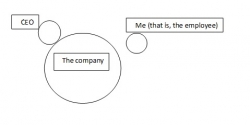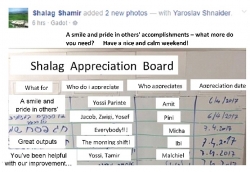In a course I gave to a certain company, some employees mentioned the "lean production" the company was implementing at one of its divisions. Nathan, who works at that division, stated that "actually, all this lean stuff has one hidden agenda.
It's directed towards moving maintenance over to the operators, loading them with more tasks than they are already loaded with".
Nathan's suggestion that management's step towards implementing lean production has a hidden agenda that threatens employees, is an expression of lack of trust in the company's steps.
A similar incident occurred a few weeks before with a larger group of employees.
So?
In the end, it is management's role and responsibility to lead steps that will ensure its strength and profitability, even if employees become suspicious and unhappy with these steps. The company management above has decided to implement lean production for the benefit of the company and is leading the process. So why isn't this good?
In order to address this question, let's briefly examine the source and principles of lean production:
Toyota Production System (TPS)
Toyota developed its production system at the beginning of the 1940's, to provide added value to its customers and prevent waste.
Added value to the customer was defined as product action:
- that the customer is willing to pay for,
- that changes the product,
- that ensures proper manufacture the first time around.
Waste:
Toyota defined 7 types of waste (Muda):
- Waste of overproduction (largest waste)
- Waste of time on hand (waiting)
- Waste of transportation
- Waste of processing itself
- Waste of stock on hand
- Waste of movement
- Waste of manufacturing defective products
To present these objectives, Toyota developed a production method based on the principles below and included a large set of tools (eg. 5S, Kanban, OEE, etc.)
The principles of Toyota's "Lean Production" are:
- Constant improvement
- Mutual respect
- Long term policy
- A production process appropriate for correct results
- Added value to organization by development of employees and partners (including suppliers)
- Continuous resolution of root problems creates a learning organization.
In this list of principles, we see the important position Toyota has granted its employees in specific, and to the human factor in general, both within and outside the organization, in their attempt to attain objectives.
Toyota define mutual respect as:
- Respect: We respect each other, make every attempt to understand one another, take responsibility and do all we can to create bonds of trust.
- Teamwork: We encourage personal and professional growth, share in opportunities to develop and maximize performance of both the individual and the team.
The sense of sharing and involvement among employees is a key component for success.
When Toyota's production method reached the West, it was given various names, the popular one being lean production or lean management. However, the essence has not changed – the objectives, principles and set of tools have remained.
If employees do not feel like central partners in the process, we will obtain something else. We will not attain the immense advantages inherent in lean production.
The emphasis is on employee feelings. Management may have intended to share with employees and perhaps even performs some steps in this regard. But if employees feel threatened by the new method, it is a sign that management has failed in getting the message across and in creating a sense of partnership.
Without full employee involvement, we will attain different processes of efficiency that will bring in only partial results, and I dare to say that they probably won't survive for very long.
Because where there is no connection and identity in interests, negativity abounds.
Summary
In this article, I have presented in a nutshell the essence of Toyota's Lean Production or Lean Management, to emphasize the central position of employees in attaining objectives.
When one of your foundation pillars is shaky, you cannot build your tower. If you have not succeeded in connecting your employees, take a step back, determine where the error lies and fix it.












 My First Book: Manage! Best Value Practices for Effective Management
My First Book: Manage! Best Value Practices for Effective Management